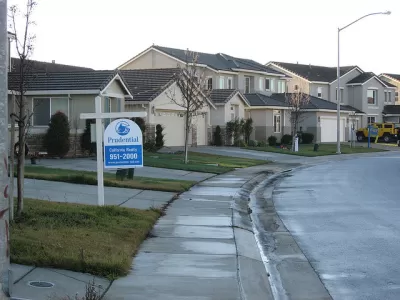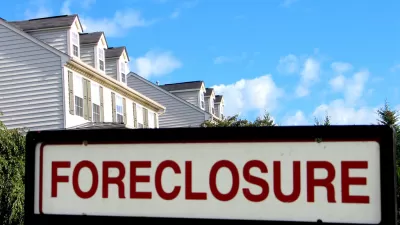The housing market has yet to devolve like in 2008, thanks to a federal safety net put in place in March, but a wave of foreclosures is still a possibility as protections begin to expire.

The Federal Housing Finance Agency (FHFA) has been insulating the U.S. housing markets since March with measures like a foreclosure moratorium for federally backed mortgages and forbearance for homeowners experiencing financial hardship during the pandemic.
But the foreclosure moratorium is set to expire in August, according to an article by Jeff Andrews, risking a wave of foreclosures like during the Great Recession. That expiration data comes with the additional risk presented by a rising mortgage delinquency rate among homeowners. "In January, just 3.22 percent of mortgages were in delinquency. By May, that number shot up to 7.76 percent — about three points shy of where the delinquency rate peaked during the financial crisis of 2008, which was at 10.57 percent," reports Andrews.
There's no need to panic yet, according to Andres. The forbearance protection will last for a year, but even that extra protection will run out eventually, if the economic effects of the pandemic lingers in the United States into 2021.
Meanwhile, protections offered by the federal government to low-income renters have already expired last week, sparking concern about a coming wave of evictions and increasing homelessness.
FULL STORY: A Foreclosure Crisis Could Still Happen

Alabama: Trump Terminates Settlements for Black Communities Harmed By Raw Sewage
Trump deemed the landmark civil rights agreement “illegal DEI and environmental justice policy.”

Planetizen Federal Action Tracker
A weekly monitor of how Trump’s orders and actions are impacting planners and planning in America.

The 120 Year Old Tiny Home Villages That Sheltered San Francisco’s Earthquake Refugees
More than a century ago, San Francisco mobilized to house thousands of residents displaced by the 1906 earthquake. Could their strategy offer a model for the present?

In Both Crashes and Crime, Public Transportation is Far Safer than Driving
Contrary to popular assumptions, public transportation has far lower crash and crime rates than automobile travel. For safer communities, improve and encourage transit travel.

Report: Zoning Reforms Should Complement Nashville’s Ambitious Transit Plan
Without reform, restrictive zoning codes will limit the impact of the city’s planned transit expansion and could exclude some of the residents who depend on transit the most.

Judge Orders Release of Frozen IRA, IIJA Funding
The decision is a victory for environmental groups who charged that freezing funds for critical infrastructure and disaster response programs caused “real and irreparable harm” to communities.
Urban Design for Planners 1: Software Tools
This six-course series explores essential urban design concepts using open source software and equips planners with the tools they need to participate fully in the urban design process.
Planning for Universal Design
Learn the tools for implementing Universal Design in planning regulations.
Clanton & Associates, Inc.
Jessamine County Fiscal Court
Institute for Housing and Urban Development Studies (IHS)
City of Grandview
Harvard GSD Executive Education
Toledo-Lucas County Plan Commissions
Salt Lake City
NYU Wagner Graduate School of Public Service





























